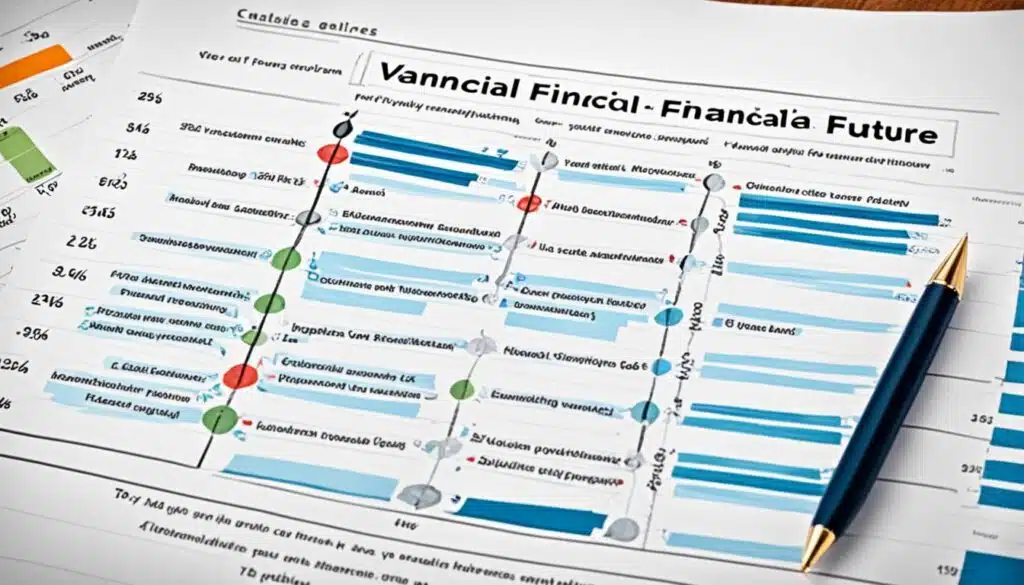Want to buy your first home, live comfortably when you retire, or go on the vacation of your dreams? Setting up long-term financial goals is key. Yet, saving for the future can be hard when there are so many bills. This is especially true if you live paycheck to paycheck. We often skip thinking about our big dreams because daily expenses take priority.
But having a clear goal can change things. It helps you spend your money more wisely. With a goal in mind, you can focus and reach for the future you want.
Key Takeaways
- Setting long-term financial goals can help you achieve your dreams and aspirations.
- Budgeting and prioritising spending can make it easier to save for the future.
- Building an emergency fund and paying off debt are important steps in reaching your financial goals.
- Investing for the long-term can help you reach your retirement and other long-term financial goals.
- Protecting your income and assets through insurance can safeguard your financial future.
Introduction: The Importance of Setting Financial Goals
Setting financial goals is very important. It helps you plan for the future and feel secure. Whether it’s buying a new home, saving for retirement, or getting out of debt, clear goals help you on your way. This section talks about why financial goals matter and the big wins of having long-term goals.
Why Setting Financial Goals is Essential
Financial goals are like a guide. They keep you aiming for success. They help you focus your money where it needs to go. This way, you can see how you’re doing, find areas to improve, and make smart money choices.
Benefits of Having Long-Term Financial Goals
Long-term money goals, like saving for a house or your child’s education, can change your financial life. They make you think about how you spend and stop any bad money moves. Achieving these goals brings a strong feeling of success. It makes you and your family’s future brighter.
Remember, working on your financial goals is a continuous effort. Stay focused, ready to adapt, and disciplined. This helps in achieving a prosperous future.
“The key to achieving financial goals is not focusing on the goal itself, but on becoming the type of person who can achieve that goal.” – Jim Rohn
Also Read : What Are The Safest Low Risk Investment Options?
Define Your Financial Goals
Setting financial goals for the short, medium, and long term is crucial. It helps you avoid overspending and ensures you’re ready for unexpected costs or retirement. Without these goals, you might fall into debt and face financial risks.
Even those who plan carefully can’t foresee every emergency, like the COVID-19 pandemic. But setting financial goals allows you to plan for uncertainties and adjust your life. Remember, your goals may change as you grow and experience various stages of life.
Identifying Short-Term, Mid-Term, and Long-Term Goals
It’s key to think about short, medium, and long-term when setting goals. Doing so crafts a detailed plan for financial security and success.
- Short-term goals are achievable in one to two years. They might include saving for a car or clearing debt.
- Mid-term goals take three to five years. This could be starting an emergency fund or saving for a house.
- Long-term goals go beyond five years. These could involve saving for retirement or funding a business or your children’s education.
This breakdown helps you create a roadmap. It shows how to balance spending and saving to meet your goals, both short and long-term.
“The time to repair the roof is when the sun is shining.” – John F. Kennedy
Kennedy’s quote emphasises being proactive. It suggests setting financial goals to be ready for surprises and to reach your dreams.
Also Read : The Complete Guide To Financial Aid For College Students
Visualise Your Financial Goals

Imagining your financial success is key on the path to security and achievement. Dreaming of owning a beautiful house, a comfortable retirement, or being ready for any surprise, thinking about your perfect financial future can light up your path.
So, start by thinking what success means to you. For many, it could be a rich life with lots of things. But for some, it’s just the peace that comes with knowing they’re financially safe. Whatever your dream, seeing your financial goals can guide you on how to make it reality.
When visualising your financial goals, ask yourself:
- Where can you imagine your finances in 5, 10, or 20 years?
- What big money steps do you want to take, like getting a home, paying debts, or saving for when you stop working?
- How much money is needed for these goals, and what can you do to get it?
Envisioning your financial dreams clearly helps you understand what you want and what you need to do. Setting these goals can feel both exciting and scary, but it’s very important for moving towards your dream financial life.
“Visualisation is the first step towards achieving your goals. Once you can see it in your mind, you can work towards making it a reality.”
Don’t forget, it’s okay for your financial goals to change as life changes. Always be ready to tweak your plans, but never lose sight of your long-term dreams. With a well-thought-out strategy and a clear vision, you can actively work towards the future you see.
Make Your Financial Goals Specific and Measurable

Setting financial goals should always be clear and easy to measure. This is known as the SMART framework. This means your goals should be Specific, Measurable, Achievable, Relevant, and Time-bound. Making goals this way helps you see progress and be more successful.
First, decide exactly what you want to do. Instead of just saying “save more money,” be clear like “save £500 each month for a house deposit.” This makes your goal clear and easy to work towards.
Then, add a number or percentage to your goal to make it measurable. For example, you could set a target to cut your credit card debt in half in the next year. This way, you can see how close you are to achieving your goal.
Ask yourself these questions to be sure your goals are SMART:
- Is this goal specific enough?
- Can I measure the progress towards this goal?
- Is this goal achievable based on my current resources and circumstances?
- Is this goal relevant to my overall financial well-being?
- Have I set a time-bound deadline for this goal?
Answering these questions will help you focus your goals. This way, they will be easy to understand, track, and achieve.
| Vague Goal | SMART Goal |
|---|---|
| Save more money | Save £500 per month towards a down payment on a house within the next 24 months |
| Pay off debt | Reduce my credit card debt by 50% within the next 12 months |
| Invest for the future | Contribute £200 per month to my workplace pension to increase my retirement savings by 10% over the next 5 years |
Setting specific and measurable financial goals is the first step towards achieving your long-term financial aspirations.
Also Read : How Do I Choose The Right Financial Advisor?
Create a Budget and Prioritise Spending

Making a detailed budget is key to reaching your money goals. It helps to know what you earn and spend. This way, you can find chances to save money and use your cash smartly. The 50/30/20 rule is a great way to split your money. Use 50% for must-haves, 30% for what you like but don’t need, and 20% for saving or paying off debt.
Budgeting Tools and Techniques
Many budgeting tools are out there to aid in managing your money. From simple lists to complex apps, these help track what you earn, sort your spending, and watch how you use your money. With these aids, you’ll get a better view of your finances. This lets you choose wisely where to put your money.
Identifying Opportunities to Save Money
Understanding your budget points out where you can save money. You might cut down on spending money on things you don’t need. Or, you could try to lower your bills by talking to your providers. You may also find cheaper options for the things you must buy. This way, you can make changes to your budget that’ll help you save more.
“Budgeting is the key to financial success. It’s not about restricting your spending, but about making informed choices and prioritising your goals.”
HAVING a well-done budget is more than tracking where your money goes. It’s a plan to guide you and help you meet your future money goals. Keep checking and improving your budget regularly. This will help you keep getting closer to a financially stable life.
Also Read : The Ultimate Guide To Financial Planning For Retirement
Build an Emergency Fund

Creating an emergency fund is key to meeting your financial targets. It acts as a cushion for surprise expenses like medical bills. It also helps with car repairs and sudden job loss. By having this fund, you’re ready for life’s unexpected turns. You can then focus on saving for the future without worrying as much about a crisis.
Start by saving an amount that can cover three to six months of your needs. This is part of the 50/30/20 budget. If saving that much seems hard, begin with a smaller goal of £1,000. This sum can help with many sudden expenses.
Having an emergency fund should be at the top of your financial to-do list. It’s the base for being financially stable and able to bounce back from setbacks. After setting up your fund, you can concentrate on other money aims. These include getting out of debt, saving for the future, and preparing for retirement.
“An emergency fund is the foundation of a sound financial plan. It provides the peace of mind to weather life’s unexpected storms without derailing your long-term goals.”
Consistency is key to a strong emergency fund. Save a bit each month and see your safety net grow over time. Making this fund a priority will help you achieve your big financial dreams.
Also Read : How To Save Money On Taxes?
Pay Off Debt
Clearing debt is crucial for your financial health. Things like big credit card bills or payday loans can hurt your budget. They also make it hard to save for what you want. With the right plan to get rid of debt, you can take charge of your money. This sets you on a path towards financial security.
Debt Repayment Strategies
To tackle your debt, you need a plan. Here are some key strategies to think about:
- Debt Avalanche: First, pay off the debts with the highest interest rates. With this method, you can cut down on interest. This speeds up the process of becoming debt-free.
- Debt Snowball: Pay off your smallest debts first, no matter their interest rates. This can boost your morale as you see debts vanish one by one.
- Debt Consolidation: Combine your various debts into one. This can make your payments simpler and potentially reduce how much you pay in interest.
If your debt feels too big, it’s wise to get help. StepChange and Citizens Advice can offer you free, impartial advice. They can help you make a budget and talk to your creditors.
| Debt Repayment Strategy | Key Advantages | Potential Drawbacks |
|---|---|---|
| Debt Avalanche |
|
|
| Debt Snowball |
|
|
| Debt Consolidation |
|
|
No matter your chosen method, the secret to beating debt is to be steady and disciplined. Focus on this, and you’ll open up money for other financial goals. These could include an emergency fund or saving for your future.
Invest for Long-Term Financial Goals

Retirement may be a long way off, but the earlier you start saving, the better. Putting away money from an early age is key to having enough for the future. Investing offers a chance to earn more than you would in a regular bank account. Yet, it also means you could lose money, so think carefully.
Understanding Investment Risks and Returns
With investing, knowing the risks and finding the right strategies is vital. This helps achieve your financial dreams in the long term.
- Risk tolerance: Think about how much risk you are okay with. Look at your financial situation to decide on the risk level you can handle.
- Diversification: Spread your money in different ways, like in stocks, bonds, or housing. This helps lower the chance of losing everything at once.
- Mark your goals: Pick investment strategies that match your long-term aims. Remember, the market might be up and down in the short term.
- Advice matters: Getting help from a professional financial adviser can guide you through the complexities of investing. They can create a plan that’s just for you.
While investing involves risks, it also can lead to bigger earnings over the years. Knowing how much risk you can take, spreading your money smartly, and keeping your goals in mind can help your money grow.
“Investing is the process of committing resources, usually money, with the expectation of generating an income or profit.”
Protect Your Income and Assets

It’s vital to secure your earnings and assets for the future. Life insurance and disability income insurance are key. They guard against unforeseen circumstances. For example, if you depend on your work, get these covers.
Life Insurance: Providing for Your Loved Ones
Life insurance is critical if your family relies on what you earn. Your loved ones won’t face financial hardship if something happens to you. Life insurance provides for them in your absence. Term life insurance is usually the simplest and most affordable type. It offers protection for a set time.
Disability Income Insurance: Protecting Your Earning Potential
If you get too ill or hurt to work, disability income insurance steps in. It covers part of your income. It’s often more helpful than state benefits. This means you can keep up your usual lifestyle even if something goes wrong.
Buying these types of insurance is a smart move. They ensure your “income protection” and look after those you care about, even when life takes unexpected turns.
“Protecting your income and assets is crucial for long-term financial safety. With life and disability insurance, you and your family have the needed financial security.”
To ensure a financially stable future, plan for both the short and long term. The right insurance will protect your earnings and assets. This gives you and your family calmness. Knowing you’re prepared for whatever comes is invaluable.
Save for Retirement
Saving for retirement is key for your financial future. Workplace and personal pensions both help, but they work differently based on your job.
Workplace Pensions
Working? Your job may come with a workplace pension scheme. These pensions often include money from your boss, making them a good deal. It’s wise to know your pension’s details. This includes how much you should save to get your employer’s full match, if they offer it.
Personal Pensions
Not tied to a job’s pension or self-employed? Personal pensions are there for you. They let you put in money regularly and get some tax back. This extra cash helps your retirement savings grow.
Choosing the right personal pension is critical. Look at different options. Pick one that fits your money goals for the future.
For everyone, saving for retirement matters. Knowing about workplace and personal pensions helps. It lets you plan well for your future.
| Workplace Pensions | Personal Pensions |
|---|---|
| Offered by employers | Arranged individually |
| Employer contributions available | No employer contributions |
| Tax relief on contributions | Tax relief on contributions |
| Limited investment choices | Wide range of investment options |
Learning the differences in pension plans is key. It helps you make smart choices for your retirement savings.
Financial Goals

Reaching your financial goals takes hard work and staying at it. It’s challenging but doable with the right attitude and plans. You need to break big goals into smaller, doable steps. Keep your eyes on the long-term prize.
Achieving Your Financial Goals Through Discipline and Consistency
Staying disciplined to work on your financial dreams daily is tough. It’s easy to get off track or lose steam. But, with a detailed plan and sticking to it, you can push past these challenges.
First, check that your goals are clear and doable. Make them specific and measurable. Use Automate your savings and regularly review your budget to make sure you’re progressing. If you fall behind, don’t worry. You can change your plan or find new ways to save more.
It’s vital to be consistent in achieving your financial goals. Get into the routine of saving and investing. Make it a habit to review your progress often. Pat yourself on the back for even the tiny victories. It helps keep you going strong.
Setting financial goals is something you do over time. Achieving them takes patience and sticking to your plans. With dedication and small steps forward, you can meet your financial goals. This means a brighter financial future awaits.
“The secret of getting ahead is getting started. The secret of getting started is breaking your complex overwhelming tasks into small manageable tasks, and then starting on the first one.”
Also Read: Mastering Money: Advanced Finance Courses For Professionals
Conclusion
Setting smart financial goals is key to success. By knowing what you want, planning carefully, and tracking your progress, you can achieve a lot. This includes saving for emergencies, paying debts, and investing for your future.
It’s important to stay focused and keep going. With the right money habits, anyone can build a stable financial life. Planning well and managing your money wisely lead to a better tomorrow.
The road to financial health might be tough. But, with clear goals, a good plan, and hard work, you can make it. Keep aiming for your dreams, no matter the challenge. You will reach a point of security and prosperity.
FAQs
What are long-term financial goals?
Long-term financial goals are the ‘big things’ you want to achieve. They take 5 years or more. This can include buying a home, world travel, paying for education, career breaks, being debt-free, early retirement, or starting a business.
Why is it important to set financial goals?
Setting financial goals helps you become secure. It keeps you focused and mindful of spending. These goals help you reach your dreams.
How do I define success when setting financial goals?
Defining success can be hard at first. Think about what success means to you. It might be a rich life or just financial safety. Envision your future and set goals that match this definition.
What is the 50/30/20 budgeting approach?
The 50/30/20 rule divides your income to cover certain areas. Allocate 50% for needs, 30% for wants, and 20% for savings. This approach prevents you from overspending and helps keep goals on track.
Why is building an emergency fund important?
An emergency fund is essential for unexpected times. It should ideally cover three to six months of your basic expenses. This fund is crucial for achieving your long-term financial security goals.
How do I pay off debt effectively?
Start by paying off high-interest debts. This includes things like credit cards. Then turn to debts with lower interest. If you’re really struggling, seek free debt advice or help from a debt charity.
How do I save for retirement if I’m self-employed?
Self-employed and saving for retirement? It may require a bit more effort on your part. Check your budget and see how much you can put into a pension on your own.
How can I protect my income and assets?
Life insurance helps your loved ones if you die early. Disability insurance can cover you if you’re unable to work due to a severe illness or injury. These protect your income and assets.









